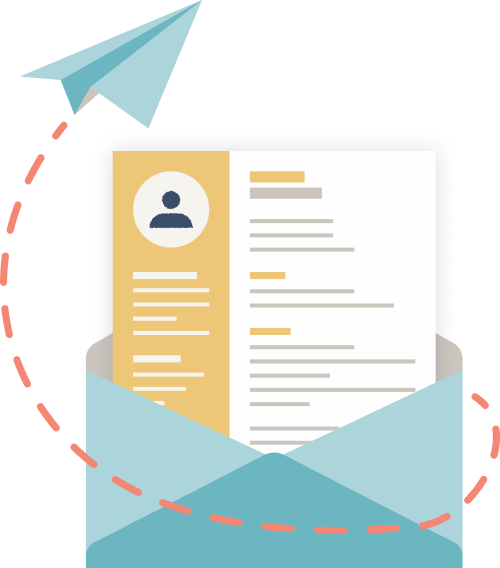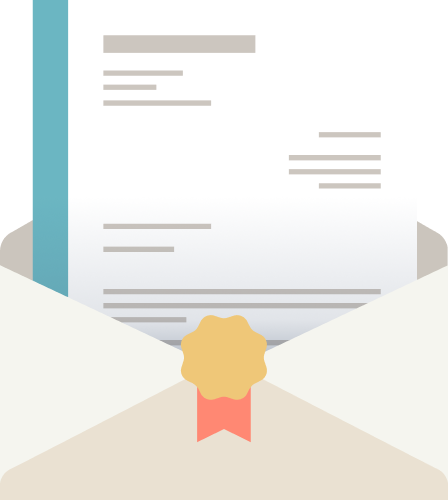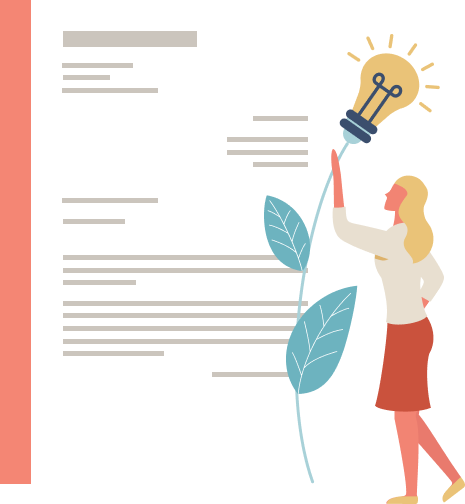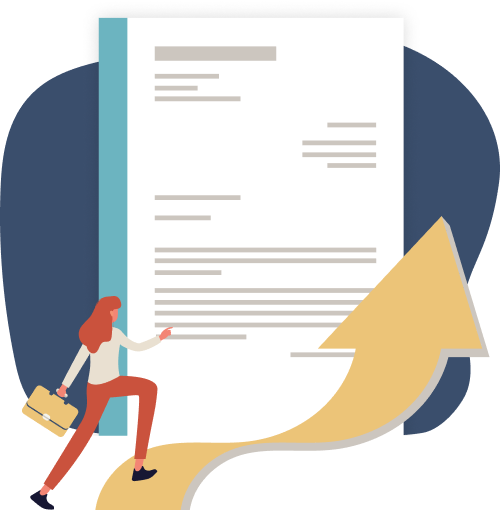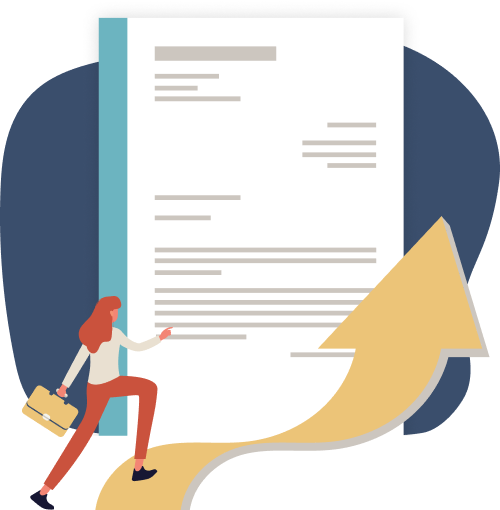How to write a cover letter with no experience
When writing a cover letter with no experience, you want to do your best to convince the recruiter that you are nevertheless the right candidate. Opt for a professional tone, and a classic format and focus on emphasising your skills to the fullest.

Our customers have been hired by: *Foot Note
Writing a cover letter is not an easy thing to do, even for an experienced professional. Combine this with a lack of professional experience – all help is welcome.
In this comprehensive guide, we show you how easy it is to write a great cover letter without any experience.
We’ll walk you through all its elements, show you examples and ways to stand out.
Let’s get down to details!
How do I write a cover letter with no experience step by step
Lack of experience is not the end of the world - on the contrary, it is the beginning! If you are new to the job market or in the process of a career change, your drive and eagerness to learn are your greatest assets.
Use your skills to write an application that will make you stand out. Fine-tune your CV to perfection and then move on to writing the cover letter.

STEP 1
Research the company
Before you start writing, do your research on the company. Get to know its values, culture and the specific requirements of the position. Tailor your cover letter to what the company is looking for in a candidate.
STEP 2
Study the job offer in detail
Use the same vocabulary as in the job offer to describe your skills and professional profile. This will ensure you include relevant keywords from the job description. Many companies use applicant tracking systems (ATS) to scan for these keywords, so including them can increase your chances of passing the initial screening.
STEP 3
Highlight your skills
Even if you don't have direct experience, highlight transferable skills gained through education, volunteering, internships or extracurricular activities. These may include communication, teamwork, problem-solving, time management and adaptability.
STEP 4
Show enthusiasm
As an entry-level candidate, you will need to work extensively to gain the necessary knowledge and experience to master your position. Show genuine enthusiasm and a willingness to learn and develop within the company. Employers appreciate candidates who are open to training and development.
STEP 5
Be concise and focused
Your cover letter should be brief and to the point. Avoid unnecessary detail and long paragraphs. Try to strike a balance between providing enough information to demonstrate your suitability and keeping the reader's interest. Opt for a classic cover letter format that fits on one page.
STEP 6
Follow the employer's instructions
If the job advert contains specific instructions for the application process, follow them. This may include submitting your cover letter in a specific format or providing specific information.
STEP 7
Use a professional tone
Maintain a professional tone throughout your letter. Avoid overly casual language and make sure your grammar and spelling are impeccable. Don't forget to proofread your letter to ensure you haven't made any mistakes.
STEP 8
Tailor it to each application
Tailor your cover letter to each job application. Be sure to mention the name of the company and the position you are applying for. This customisation shows your genuine interest in the position and sets you apart from general applications.
What to include in a cover letter with no experience
Your cover letter should first and foremost fulfil its purpose, i.e. to convince the recruiter to invite you for an interview.
It means it has to be professional and convincing.
Make sure it contains:
The necessary contact details
Not only your contact details, which is quite obvious but also those of the person you are writing to.
Include your name at the top of the cover letter, followed by your address, telephone number and e-mail address. Underneath this, include the date and then the recipient’s details.
Salutation
If possible, address the hiring manager or recruiter by name. If you do not have a specific name, use a general greeting such as “Dear Hiring Manager”.
Introduction
Mention the position you are applying for.
Express your interest in the company and write why you are interested in this opportunity.
Education
Highlight your education, including degree, school and date of completion.
Highlight relevant courses or projects that demonstrate your skills. List why your education may be useful in your future position.
Transferable skills
Identify and discuss transferable skills gained through education, volunteering, internships or extracurricular activities.
Highlight skills such as communication, teamwork, problem-solving, time management and adaptability.
If you have hard skills that are relevant to the job, mention them too.
Relevant achievements
Mention any achievements, awards or honours.
If applicable, discuss specific projects or activities that demonstrate your skills.
Why you are the right candidate
Relate your skills and experiences to the specific requirements of the position.
Link your skills to the needs of the company, demonstrating an understanding of the role.
Commitment and willingness to learn
Express your willingness to learn and develop new skills. Emphasise your enthusiasm for the position and the company.
Explain why you are interested in the role and how it aligns with your career goals.
Express your openness to training and commitment to professional development.
Summary
Once again, summarise why you think you are a good candidate.
Express your gratitude for the opportunity to apply and your interest in discussing your qualifications further.
Formal closing
End your letter with a formal ending – yours faithfully or yours sincerely, depending on the salutation used.
Template of cover letter with no experience to fill in
View a simple cover letter template with no experience that you can copy and personalise to create your own application.
Your contact details
Date
Recipient’s contact details
Dear [Ms. or Mr. Surname],
I was motivated to contact you upon learning that [Company] has an opening for a new [Job Title]. As an ambitious and hard-working person, I know that I can step into the [Job Title] role and make a positive impact on [company]’s goals.
The value I will bring to the Company team includes strong organisational skills, attention to detail and teamwork. Through my academic and work-related experiences, I have developed proficiency in creative problem-solving and time management. These qualities will help to support [Company]’s mission while reflecting positively on the professionalism and competencies of its employees.
For further details of my qualifications, background, and contributions, please take a moment to review my enclosed CV. I believe that I can successfully be the [Job Title] you’re seeking and I welcome the opportunity to speak with you at your earliest convenience.
Yours sincerely,
Your full name
Case study of a Cover letter with no experience
Here is a professionally written example of a cover letter with no experience for a recent graduate.
Zara Bond
64 Dunstan Close,
Bristol, BS35 3QK
zara.bond@example.co.uk
10 November 2023
Boots UK Ltd
Bristol, BS5 9TG
jobs@boots.co.uk
Dear Hiring Manager,
I am writing to express my interest in the Trainee Pharmacist position at Boots, as advertised. Recently graduated with a BSc in Pharmacy from the University of Bristol, I am eager to bring my skills and enthusiasm to your high-performing team.
During my time at the University of Bristol, I honed my documentation, reporting, and payment processing skills, supplementing my education with a self-initiated exploration of quality control. Engaging in collaborative group projects enhanced my communication and analytical thinking abilities, preparing me for a team-driven environment.
Boots’ commitment to excellence in pharmaceutical services aligns with my aspirations, and I am confident that my dedication and skills would make a valuable contribution to your team. My CV is attached for your review, and I look forward to the possibility of discussing how my qualifications meet the needs of the role.
Thank you for considering my application. I am enthusiastic about the opportunity to contribute to Boots and further my professional development.
Sincerely,
Zara Bond
Do you see how, despite having no actual work experience, this person makes an impression of a good candidate?
This letter is good for several reasons:
It is concise and to the point, conveying the most important information without unnecessary detail. This is important because hiring managers often have limited time to review applications.
The letter clearly identifies the position to which the candidate is applying and expresses a genuine interest in the role. It demonstrates a direct link between the candidate’s skills and experience and the requirements of the Trainee Pharmacist position.
The candidate highlights key skills gained during the academic experience, including documentation, reporting, payment processing and self-initiated quality control testing. These are directly related to the pharmaceutical industry and the requirements of the position.
The mention of self-initiated learning and quality control testing demonstrates the candidate’s proactive approach to professional development and learning beyond the standard curriculum.
The letter highlights the candidate’s experience in collaborative group projects, demonstrating their ability to work effectively in a team. This is particularly important for positions requiring collaboration, such as healthcare environments.
The candidate expresses alignment with the company’s commitment to excellence in pharmaceutical services. This shows that the candidate has become familiar with the company and understands its values and goals.
The letter ends with a proactive statement expressing a willingness to discuss how the candidate’s qualifications match the needs of the position. This demonstrates enthusiasm and a willingness to move forward in the application process.
The overall tone of the letter is professional and positive, conveying enthusiasm for the position and a respectful appreciation of the opportunity.
Creating an attractive cover letter without experience requires striking a balance between professionalism and reader-friendliness. By using a structured approach, you can effectively showcase your skills, enthusiasm and potential contribution to a potential employer. Take a look at the available cover letter templates to create a flawless application.

Jagoda Jaskowicz
Senior Content Editor, Translator
*The names and logos of the companies referred to above are all trademarks of their respective holders. Unless specifically stated otherwise, such references are not intended to imply any affiliation or association with myperfectCV.





